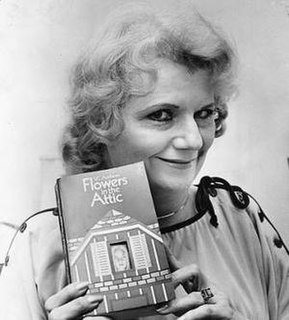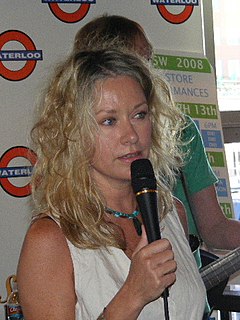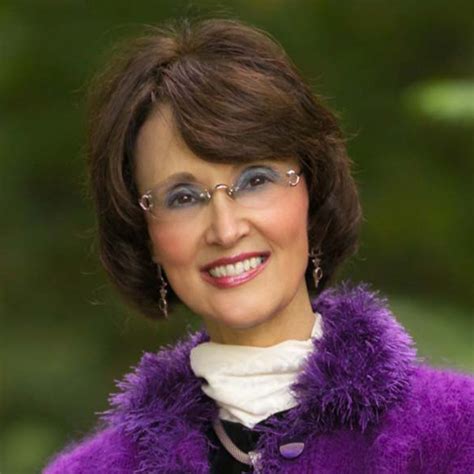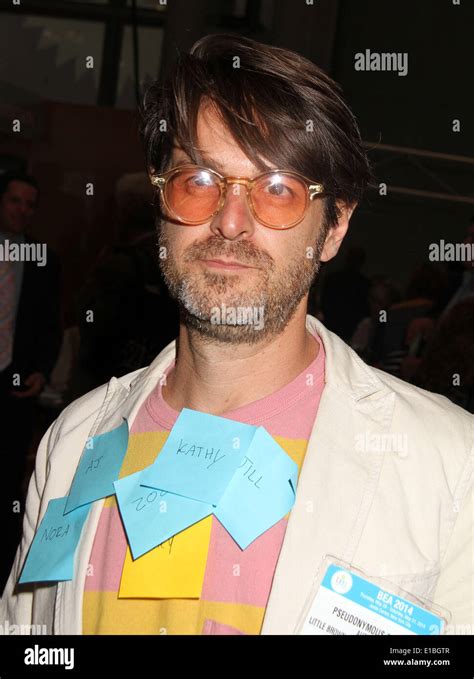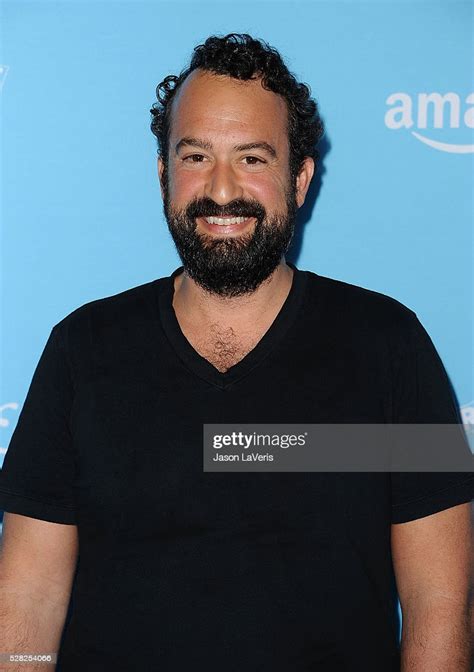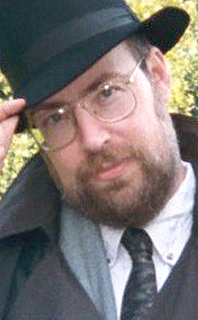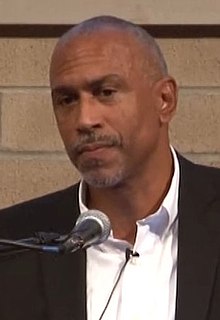Top 283 Schooling Quotes & Sayings - Page 5
Explore popular Schooling quotes.
Last updated on April 20, 2025.
Do we really need school? I don't mean education, just forced schooling: six classes a day, five days a week, nine months a year, for twelve years. Is this deadly routine really necessary? And if so, for what? Don't hide behind reading, writing, and arithmetic as a rationale, because 2 million happy homeschoolers have surely put that banal justification to rest.
I can only think that the book is read because it deals with the difficulties of schooling, which do not change. Please note: the difficulties, not the problems. Problems are solved or disappear with the revolving times. Difficulities remain. It will always be difficult to teach well, to learn accurately; to read, write, and count readily and competently; to acquire a sense of history and start one's education or anothers.
You convey too great a compliment when you say that I have earned the right to the presidential nomination. No man can establish such an obligation upon any part of the American people. My country owes me no debt. It gave me, as it gives every boy and girl, a chance. It gave me schooling, independence of action, opportunity for service and honor. In no other land could a boy from a country village, without inheritance or influential friends, look forward with unbounded hope. My whole life has taught me what America means. I am indebted to my country beyond any human power to repay.
Government schooling made people dumber, not brighter; made families weaker; ruined formal religion with its hard-sell exclusion of God; set the class structure in stone by dividing children into classes and setting them against one another; and has been midwife to an alarming concentration of wealth and power in the hands of a fraction of the national community.
One of the things that any kind of studies bring out is that the mere act of schooling - getting together, the organization involved, going to classes on time, and there're things being taught, sitting down with others with different backgrounds, chatting with them, and, sometimes when there are big barriers, eating together when there are school meals, which are big things together with a big social impact - they themselves have a major effect.
Not to find one's way in a city may well be uninteresting and banal. It requires ignorance - nothing more. But to lose oneself in a city - as one loses oneself in a forest - that calls for a quite different schooling. Then, signboard and street names, passers-by, roofs, kiosks, or bars must speak to the wanderer like a cracking twig under his feet in the forest.
Not to find one's way around a city does not mean much. But to lose one's way in a city, as one loses one's way in a forest, requires some schooling. Street names must speak to the urban wanderer like the snapping of dry twigs, and little streets in the heart of the city must reflect the times of day, for him, as clearly as a mountain valley. This art I acquired rather late in life; it fulfilled a dream, of which the first traces were labyrinths on the blotting papers in my school notebooks.
In Jamaica we had the English way of schooling from the age of four, so when I got to America I was already a few years advanced because I started school at the age of three-and-a-half rather than six and my grades moved up accordingly. In America, they start you at school at six because the grades are different. I had to take a test and they didn't know what to do with me. It wasn't that I was any smarter; I had just started younger. All of a sudden I was jumped from eighth to tenth grade. They said I was very smart, but I was only smart in languages, really.
After it's all over, the early childhood, a chain of birthdays woven with candlelight, piles of presents, voices of relatives singing and praising your promise and future, after the years of schooling, fitting yourself into different size desks, memorizing, reciting, reporting, and performing for jury after jury of teachers, counselors, and administrators, you still feel inadequate, alone, vulnerable, and naked in a world that can be unforgiving and terribly demanding.
Apparently almost anyone can do a better job of educating children than our so-called 'educators' in the public schools. Children who are home-schooled by their parents also score higher on tests than children educated in the public schools. ... Successful education shows what is possible, whether in charter schools, private schools, military schools or home-schooling. The challenge is to provide more escape hatches from failing public schools, not only to help those students who escape, but also to force these institutions to get their act together before losing more students and jobs.
I've noticed a fascinating phenomenon in my twenty-five years of teaching - that schools and schooling are increasingly irrelevant to the great enterprises of the planet. No one believes anymore that scientists are trained in science classes or politicians in civics classes or poets in English classes. The truth is that schools don't really teach anything except how to obey orders.
There's not anything I can fix, change, make better its out to the world. I'd like to say that I like my records but it's for reasons other than enjoyment, it's more like a notch on my revolver, one more down. I am proud of my work, yes but its accomplishment to me and another year of schooling,in making records it can always be better!
My schooling was very conservative. I went to Trinity School, and then to the Hill School, which is a boarding school, then to Yale. My parents got divorced in that period, and I realized I didn't have a life anymore. I was the only child, so a three-person family breaks apart. I ended up very conformist, very scared, very lonely. I couldn't go on with Yale, just couldn't do it. I'd been doing too much of that for too long. I didn't know what I wanted, but I knew what I didn't want, which was to go to Wall Street and join the crowd there.
Through private investment capitalism kept raising the productivity of labor to new heights. Parents were able to earn enough so their offspring did not have to join the work force at an early age. This produced something unique in history: Childhood, a time when the young could experience the innocence of play and opportunity of schooling before entering the world of work.
Jane was my wicked stepmother: she was generous, affectionate and resourceful; she salvaged my schooling and I owe her an unknowable debt for that. One flaw: sometimes, early on, she would tell me things designed to make me think less of my mother, and I would wave her away, saying, Jane, this just backfires and makes me think less of you.
During our mortal schooling in submissiveness, we will see the visible crosses that some carry, but other crosses will go unseen. A few individuals may appear to have no trials at all, which, if it were so, would be a trial in itself. Indeed, if, as do trees, our souls had rings to measure the years of greatest personal growth, the wide rings would likely reflect the years of greatest moisture-but from tears, not rainfall.
We must be trained to clarify minds, heal broken hearts, and create homes where sunshine will make an environment in which mental and spiritual health may be nurtured. Our schooling must not only teach us how to bridge the Niagara River gorge, or the Golden Gate, but must teach us how to bridge the deep gaps of misunderstanding and hate and discord in the world.
There may be countries [where] there's no gender inequality in schooling, even in higher education, but [where there is] gender inequality in high business. Japan is a very good example of that. You might find cases in the United States where at one level women's equality has progressed tremendously. You don't have the kind of problem of higher women's mortality as you see in South Asia, North Africa, and East Asia, China, too, and yet for American women there are some fields in which equality hasn't yet come.
By 1940 the literacy figure for all states stood at 96 percent for whites. Eighty percent for blacks. Notice for all the disadvantages blacks labored under, four of five were still literate. Six decades later, at the end of the 20th century, the National Adult Literacy Survey and the National Assessment of Educational Progress say 40 percent of blacks and 17 percent of whites can't read at all. Put another way, black illiteracy doubled, white illiteracy quadrupled, despite the fact that we spend three or four times as much real money on schooling as we did 60 years ago.
Sometimes a rural life - without agricultural culture, community, or land - it means that you're a very long drive from everything. It's a big cultural isolation in terms of any kind of schooling where you could get exposed to things that might push the positive buttons. The geography of where people find themselves situated, both in metropolises and in the heartland, really starts to matter.
The nature of schooling as we know it has become the unquestioned answer to educating our children. It is not. Knowing what we now know, we can no longer do what we now do. It is time to reconnect our children and our systems to their abundant learning potentials and reengage them in the joy of learning.
But for poor black people and working-class black people, it is a much more difficult way to go. The over-incarceration of black people is just intolerable. When you look at the disparity in terms of education and access to fair schooling, it is horrible. If this would happen to white people in this country, it would not be tolerated.
[Robin Stewart] was your man. True for you, you had withdrawn the crutch from his sight, but still it should have been there in your hand, ready for him. For you are a leader-don't you know it? I don't, surely, need to tell you?-And that is what leadership means. It means fortifying the fainthearted and giving them the two sides of your tongue while you are at it. It means suffering weak love and schooling it till it matures. It means giving up you privicies, your follies and your leasure. It means you can love nothing and no one too much, or you are no longer a leader, you are led.
We were not born critical of existing society. There was a moment in our lives (or a month, or a year) when certain facts appeared before us, startled us, and then caused us to question beliefs that were strongly fixed in our consciousness-embedded there by years of family prejudices, orthodox schooling, imbibing of newspapers, radio, and television. This would seem to lead to a simple conclusion: that we all have an enormous responsibility to bring to the attention of others information they do not have, which has the potential of causing them to rethink long-held ideas.
You know, people always warn children about taking candy from strange adults. But they never warn us adults about taking candy from strange children. All those sweet-looking kids who sell boxes of candy bars on the street to help pay for schooling - how do we know what's in those bars? And don't even get me stated on that nefarious institution designed to lure unsuspecting customers into buying mysterious frosted goodies: the bake sale. Adults, be warned: if a child wanted to poison you it would be a piece of cake! Literally a piece of cake.
The understanding that women are not inferior across the world, it's something that you can get from school, not only from the book but also from chatting with other kids. It's a big impact. One of the curious things is that even when - and this we found from studies - the schools are doing pretty badly in terms of their education, about mathematics and literature and language, going to school transformed people because I think the action of schooling, the activity, is very important.
China's republican politics is like a child who just started schooling. He must have a good teacher and be surrounded by good friends. By the same token, the Chinese people, new to the republican politics, must be educated properly. The revolutionary government should be the people's tutor to impart advanced awareness and experience.
The path to a better future goes directly through our public schools. I have nothing against private schools, parochial schools and home schooling, and I think that parents with the means and inclination should choose whatever they believe is best for their children. But those choices cannot compete, and cannot come at the expense of what has been -- and what must always be -- the great equalizer in our society, a free and equal public education.
The production of knowledge in schools today is instrumental, wedded to objective outcomes, privatized, and is largely geared to produce consuming subjects. The organizational structures that make such knowledge possible enact serious costs on any viable notion of critical education and critical pedagogy. Teachers are deskilled, largely reduced to teaching for the test, business culture organizes the governance structures of schooling, knowledge is viewed as a commodity, and students are treated reductively as both consumers and workers.
I think one of the problems [with raising intelligent children] is compulsory schooling...and that children are sitting there and they are taught and told what to believe. They are passive from the very beginning, and one must be very, very aggressive intellectually to have a high IQ [...] the child is taught. Right from the beginning, it's a passive process. He or she sits there, and they simply try to believe everything they're told.
In education, it is said that the state must impose schooling on all children, else the parents and communities will neglect it. Only the state can make sure that no child is left behind. The only question is the means: will we use the union and bureaucracies favored by the left, or the market incentives and vouchers favored by the right. I don't want to get into a debate about which means is better, but only to draw attention to the reality that these are both forms of planning that compromise the freedom of families to manage their own affairs.
I don’t think we’ll get rid of schools any time soon, certainly not in my lifetime, but if we’re going to change what’s rapidly becoming a disaster of ignorance, we need to realize that the institution “schools” very well, but it does not “educate”; that’s inherent in the design of the thing. It’s not the fault of bad teachers or too little money spent. It’s just impossible for education and schooling to be the same thing.
Jane was my wicked stepmother: she was generous, affectionate and resourceful; she salvaged my schooling and I owe her an unknowable debt for that. One flaw: sometimes, early on, she would tell me things designed to make me think less of my mother, and I would wave her away, saying, 'Jane, this just backfires and makes me think less of you.'
I mean, growing up in New Orleans when you're in seventh and eighth grade and you're into music and you're a dorky dude, you know, you listen to the entire Rush catalog and the entire Zeppelin catalog and you go through these, like, phases of classic rock. It definitely speaks to our dorkiness and the similar hometown that we grew up in, the similar sort of schooling we went through and friends we had.
What would the world be like if you had to develop a power yourself before you could use it? Just as a silly example: How would the comment section on YouTube change if, to use it, you had to have the schooling necessary to have a basic understanding of how computers and the internet work? More seriously, would anyone smart enough to know how to design and build a tank, or a laser guided anti-aircraft missile, or a computer and video editing software be stupid enough to join ISIS? In fact, if such knowledge was required—would it even be possible for there to be standing armies?
The origins of these [schooling] federal policies were tied to President Johnson's war on poverty. Supplemental funds were sent to school districts serving poor children to compensate for issues related to poverty. Since the enactment of NCLB, the focus on mitigating poverty has been replaced by a focus on accountability as measured by test scores.









